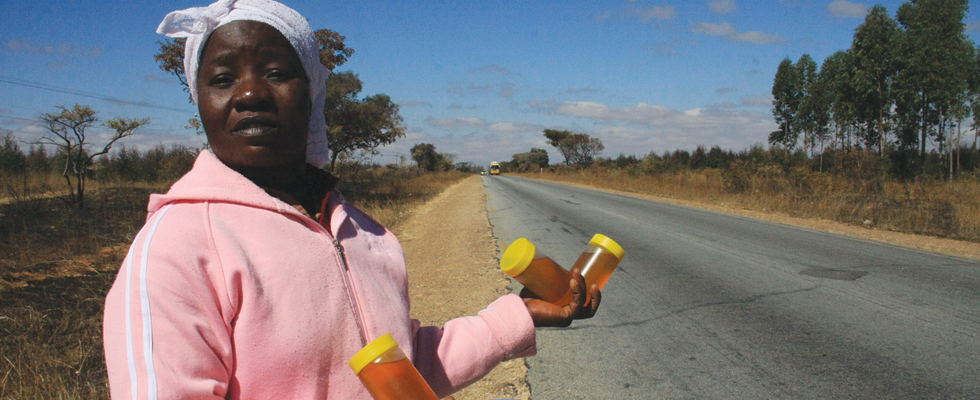
MARONDERA – Due to the high rate of unemployment in the country, scores of youths from Marondera have embarked on selling homemade honey along the Harare–Mutare Highway to earn a living. OWN CORRESPONDENT
These youths ply their trade at the railway line just before one gets into Marondera.
It has become their common marketplace to clients and their targeted customers being motorists who drive along the highway.
Actually, selling honey has become the main source of income for many a family in this farming town.
However, some of the youths that sell honey have got diplomas, and even degrees, but failed to secure employment.
One of the vendors who referred to himself only as Samuel said that he passed his “A” Level and has got a Diploma in Social Work, but could not secure a job.
“I have a Diploma in Social Work, but l have lost hope in ever securing a job. Hence the reason l have turned to selling homemade honey for survival,” Samuel said.
Another vendor, Kudzanai Makichi also echoed similar sentiments, saying that since it’s difficult to secure a job he has resolved to selling honey.
- Chamisa under fire over US$120K donation
- Mavhunga puts DeMbare into Chibuku quarterfinals
- Pension funds bet on Cabora Bassa oilfields
- Councils defy govt fire tender directive
Keep Reading
He said even if one had the right qualifications, they would end up doing odd jobs such as he is doing – selling homemade honey.
“I have been to many companies across the country for interviews and they promised to call back, but they have not. It’s the reason I have ended up here selling honey,” Makichi said.
“It is not the kind of job that l have wanted, but l am happy that at least it brings food on the table and on a good day, l go home with more than $30. For me, that’s a lot of money to take care of me and my pregnant wife.”
Despite being drawn to sell honey by different circumstances, some of the youths who spoke to NewsDay said that the homemade honey was on demand.
“A bottle of honey costs $2 and the price is negotiable. We target everyone who uses this high way,” one vendor said. Anthony Muponda, a motorist, said that he preferred homemade honey because of its affordability.
“l love the homemade honey as it is natural and also it is cheap unlike in the shops where they charge more than $2. Here you can even negotiate for the prices, even to $1,” Muponda said.
Another motorist Lizzie Mpofu said she preferred homemade honey because of its naturale and affordability.
“It is good buying fresh honey from the bush which you can also get for a $1. That’s very cheap as compared to shops who charge more than $2,” she said.
Some of the beehives are located in the gum tree bushes near the railway line. One of the vendors said the beehives have been there since 1972.
He said the white farmer who used to keep bees left during the land reform programme which saw many youths taking over the business.
A recent report by Zimbabwe Economic Society said local consumers were at the mercy of business and service providers due to exorbitant prices and generally poor goods which had flooded the market.
Liberalisation of the economy has arrested runaway inflation and improved availability of goods and services, but it has worsened the plight of consumers due to the proliferation of goods of questionable origin, the report says.











